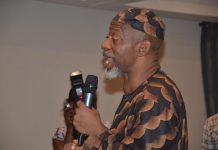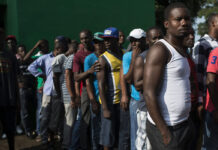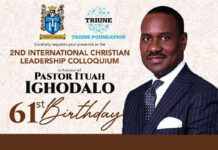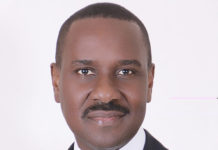 Abubakar Adam Ibrahim was bracing for a backlash when he published his provocative debut novel, “Season of Crimson Blossoms,” in Nigeria two years ago. The novel centered on a devout Muslim grandmother who has an affair with a young gang leader in his 20s, and in telling the story of a 55-year-old widow’s sexual awakening, Mr. Ibrahim took on issues like female sexuality, drug use, political corruption and ethnic violence — subjects considered taboo within northern Nigeria’s conservative and predominantly Muslim Hausa culture.
Abubakar Adam Ibrahim was bracing for a backlash when he published his provocative debut novel, “Season of Crimson Blossoms,” in Nigeria two years ago. The novel centered on a devout Muslim grandmother who has an affair with a young gang leader in his 20s, and in telling the story of a 55-year-old widow’s sexual awakening, Mr. Ibrahim took on issues like female sexuality, drug use, political corruption and ethnic violence — subjects considered taboo within northern Nigeria’s conservative and predominantly Muslim Hausa culture.
“We thought there would be a fatwa,” he said. “It talks about something that’s shocking and controversial for many people.”
Instead, Mr. Ibrahim has been hailed as a rising literary star. He won the Nigeria Prize for Literature, which comes with a $100,000 reward, and received the African Writers’s Residency Award from Germany’s Goethe Institute. The Nigerian publishing house Cassava Republic acquired international publication rights to the novel, and released it in South Africa, Kenya, Germany, Britain and the United States.
Mr. Ibrahim belongs to a new generation of young Nigerian novelists who are gaining international prominence, and his unexpected success offers the latest sign that the country’s flourishing literary scene is giving rise to some of the most groundbreaking and boundary-pushing fiction on the continent.
Nigeria has long been a vibrant literary hub, home to prominent and widely celebrated writers like the Nobel Laureate Wole Soyinka, Chinua Achebe, Ben Okri and, more recently, the novelists Chimamanda Ngozi Adichie, Lola Shoneyin and Helon Habila. In the past, successful African writers often first gained renown abroad, yet weren’t widely read in their homelands. But now, many of Nigeria’s promising young authors are increasingly building an audience at home, where there is a growing appetite for fiction that addresses contemporary issues.
A new wave of thematically and stylistically diverse fiction is emerging from the country, as writers there experiment with different genres and explore controversial subjects like violence against women, polygamy and the rise of the Islamist militant group Boko Haram.
“There are more avenues for Nigerian writers to express themselves now, and people are being more bold,” Mr. Ibrahim said.
Mr. Ibrahim’s publisher, Cassava Republic, has been at the forefront of Nigeria’s literary renaissance, and now the company has global ambitions. Last year, Cassava Republic began releasing its books in the United States, following its expansion into Britain in 2016.

Rather than selling publication rights to American publishing houses, as most foreign publishers do, Cassava Republic prints and distributes its titles to American booksellers through Consortium, a book distributor based in Minnesota. Eventually, the company plans to release all of its new titles in the United States, with first printings that range from 2,000 to 5,000 copies.
Its expansion is unlikely to have a major commercial impact, with just a handful of titles coming out in the United States and Britain each year. But culturally, the company’s global aspirations represent a significant new landmark for African literature. Until now, much if not all of the African literature in the West has been filtered through the tastes of European and American publishers and editors, who often select works they judge to be historically significant, educational or prize worthy. Now, for the first time, an African publisher is choosing which books get exported, and as a result, Western readers are gaining access to a greater variety of titles, ranging from contemporary African romance and hard-boiled crime to epic fantasy and children’s books.
“One of the things we are trying to do is expand the definition of African literature,” said Bibi Bakare-Yusuf, Cassava Republic’s co-founder and publisher. “Achebe’s ‘Things Fall Apart’ cannot define the whole continent. We should not be able to count African writers on one hand.”
When Ms. Bakare-Yusuf co-founded Cassava Republic in Abuja in 2006, her primary goal was to publish Nigerian writers who had gained stature in the West but weren’t being read at home. She began by acquiring publication rights to novels that were already available abroad, including two works by the Nigerian-born writer Abidemi Sanusi, and distributing them in Nigeria. Then she started looking for original work, and published a debut novella, “Every Day Is for the Thief,” by Teju Cole, which went on to become a critical sensation in Britain and the United States.
More than a decade later, Cassava Republic has published more than 50 titles, and has expanded into romance, crime, memoir, fantasy, science fiction and children’s books. It has published several breakout commercial hits, including Sarah Ladipo Manyika’s novel “In Dependence,” which sold more than 1.7 million copies, and “The Last Days at Forcados High School,” by A. H. Mohammed, which sold more than 2.5 million copies.
So far, Cassava Republic has published eight books in the United States, including children’s books, crime novels and literary fiction, a nonfiction book about the West African music scene and “Longthroat Memoirs,” a food memoir by Yemisi Aribisala, which came out this month. Cassava plans to publish nine books in the United States in 2018.
The novels that Cassava has distributed in the West span a range of genres, settings, subjects and styles, offering American readers a much broader view of contemporary Nigerian fiction. Novels released this year include Mr. Ibrahim’s “Season of Crimson Blossoms;” Ms. Ladipo Manyika’s novel, “Like a Mule Bringing Ice Cream to the Sun,” which centers on a 74-year-old Nigerian woman living in San Francisco, and Leye Adenle’s crime novel “Easy Motion Tourist,” a dark noir tale that unfolds in Lagos, where a British journalist who comes to cover the elections ends up investigating a series of gruesome murders targeting prostitutes.
Mr. Adenle, who grew up in Nigeria and now lives in London, said that more Nigerian novelists are experimenting with commercial tropes, writing for pure entertainment, and many no longer feel compelled to write novels that respond to the legacy of colonialism or Western notions about African literature.
As more young Nigerian debut authors rise to global prominence, the diversity and range of the country’s fiction is on full display. Chigozie Obioma’s debut novel, “The Fishermen,” a biblical parable set during the military dictatorship of the 1990s, was translated into more than 20 languages and was a finalist for the 2015 Man Booker Prize. Last year, Elnathan John’s debut novel “Born on a Tuesday,” which tackles the rise of Islamic extremism through the eyes of a homeless teenager who gets swept up in political violence, was heralded as “a stunning, important coming-of-age story” by a critic in Publishers Weekly.
 In August, Knopf published Ayobami Adebayo’s debut novel, “Stay With Me,” a portrait of a Nigerian couple struggling with infertility, whose marriage is strained when his conservative family pressures him to take a second wife. The novel, which was published in Nigeria this spring, was shortlisted for Britain’s Baileys Women’s Prize for Fiction, and received ecstatic reviews in The Guardian and The New York Times. Ms. Ayobami, who studied fiction writing with Ms. Adichie and Margaret Atwood, said she worried at first that Nigerian readers might balk at a novel that hinges on culturally touchy subjects like polygamy, infidelity and belief in magic. “I was quite nervous before the book came out here, but the response so far has been quite positive,” said Ms. Ayobami, who lives in Ile-Ife, in southwestern Nigeria.
In August, Knopf published Ayobami Adebayo’s debut novel, “Stay With Me,” a portrait of a Nigerian couple struggling with infertility, whose marriage is strained when his conservative family pressures him to take a second wife. The novel, which was published in Nigeria this spring, was shortlisted for Britain’s Baileys Women’s Prize for Fiction, and received ecstatic reviews in The Guardian and The New York Times. Ms. Ayobami, who studied fiction writing with Ms. Adichie and Margaret Atwood, said she worried at first that Nigerian readers might balk at a novel that hinges on culturally touchy subjects like polygamy, infidelity and belief in magic. “I was quite nervous before the book came out here, but the response so far has been quite positive,” said Ms. Ayobami, who lives in Ile-Ife, in southwestern Nigeria.
Writers and publishers in Nigeria still face significant obstacles. Until fairly recently, the commercial publishing market consisted primarily of educational books. Piracy remains an entrenched problem that saps profits from the music, film and publishing industries. Pirated copies of books circulate at open air markets, and formal bookstores are scarce in some regions. Illiteracy remains an entrenched problem in parts of the country. And books are still considered an out-of-reach luxury for much of the population. The minimum wage in Nigeria hovers around $59 a month, and a new book costs around $8.
Despite such hurdles, Nigeria’s publishing industry has blossomed in recent years, following the country’s return to democracy in 1999 after decades of military dictatorship.
In the last decade or so, literary festivals, book prizes and writing workshops have sprung up around the country, and a handful of influential new publishing houses have been formed, including Cassava Republic, Farafina, Parrésia and Ouida Books, which was founded last year by the novelist Lola Shoneyin.
Ms. Shoneyin, the author of “The Secret Lives of Baba Segi’s Wives,” has emerged as a prominent figure in Nigeria’s publishing scene, somewhere between an impresario and a literary fairy godmother. In addition to writing fiction and running Ouida Books, she founded the Ake Festival, a five-day literary event in Abeokuta that began in 2013, and curated the Kaduna Book and Arts Festival, which kicked off this summer in northern Nigeria, a predominantly Muslim region that has suffered attacks by the fundamentalist group Boko Haram.
The Kaduna festival, which took place last month, featured a writing workshop for women that was led by the Sudanese author Leila Aboulela, and a session in Hausa, a local language, about the significance of Hausa literature in a country where English is the official language.
“Our project is to build the Nigerian and African market, and to build a market that’s more contained,” Ms. Shoneyin said. “The success of a Nigerian writer shouldn’t depend on their success in the West.”




























